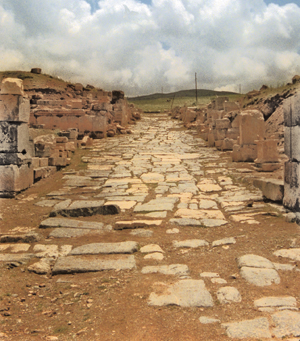Warning of Last Days (3:1–9)
Throughout chapter 3, Paul warns Timothy about certain trends he will encounter in the last days. The New Testament writers were unanimously convinced that we live in the “last days,” the “last times,” the “last hour,” and even “the end of the ages.”11 One of the features of the era between the first and second advents of Christ is the presence of great wickedness (2 Tim. 3:1–5) alongside the advance of the kingdom of Christ, who must rule in the midst of his enemies (Ps. 110:2). See also this statement in Jude: “In the last times there will be scoffers who will follow their own ungodly desires.”12
The early church fathers understood the apostolic teaching on the last days and repeated it. For instance, Ignatius of Antioch (about A.D. 108) writes: “These are the last times. Therefore let us be modest, let us fear the long-suffering of God”; note also, “For in the last days the false prophets and the corrupters shall be multiplied.”13 The Qumran group in the desert of Judea had similar notions in some of their writings, though for them, the “final days” (1Q28a) were marked by physical warfare between the “sons of darkness” and the army of the “sons of light,” that is, the sectarian group themselves (e.g., The War Scroll [1QM]), for they were “the last generation” (CD 1.12).14 The Qumran group—whom one scholar called “fanatical separatists”—was eradicated by the Romans in about A.D. 68.
Having a form of godliness but denying its power (3:5). Today people outside of the Christian church usually do not put on a show of being religious and thereby adopt a “form of godliness” or “of piety.” In our day, public demonstrations of piety are rare, but in antiquity, everyone (the Cynics and a very few others excepted) attended public religious functions. And piety in Greco-Roman religions was often measured by the size of one’s donation to the public cults, so that honorific inscriptions from temple buildings often praised the person’s “piety and generosity,” which can be thought of together as “pious generosity.” In other words, piety was commonly measured by external actions rather than by one’s character. Hence, Paul says that false teachers may have the form of godliness, but the life-transforming power of true godliness begins with the fear of the Lord (Prov. 9:10) expressed as faith in Christ.
The kind who worm their way into homes (3:6). The typical large Greek home had a clear demarcation between the public areas of the house and the women’s quarters (often on a second story). It was possible in a large household for a man to insinuate himself as a permanent guest under the patronage of the mistress of the house as a teacher or as a tutor for the children. Paul does not condemn the practice per se, but the morally corrupt hidden motives and practices that could result.
Just as Jannes and Jambres opposed Moses (3:8). These two names were assigned in Jewish sources to the Egyptian sorcerers who counterfeited the miracles of Moses in order to deceive Pharaoh (Ex. 7:11–22). While the names do not appear in the Old Testament text, Paul refers to them as commonly accepted figures with which many people were acquainted. For instance, we read this in the “Damascus Document” from Qumran: “For in ancient times there arose Moses and Aaron, by the hand of the prince of lights and Belial, with his cunning, raised up Jannes and his brother during the first deliverance of Israel” (CD 5.17–19). Even Pliny the Elder mentions Moses and Jannes in the same breath as well-known magicians from an earlier day.15
Paul’s Example (3:10–17)
Persecutions, sufferings … in Antioch, Iconium and Lystra (3:11). The Antioch mentioned here is not the one in Syria, but the Pisidian Antioch in central Asia Minor. Pisidian Antioch was founded a few centuries earlier under the Seleucid kings and had grown in importance under Augustus. The nearby Pamphylian cities, Iconium and Lystra, were on the inland route east of Antioch, with Lystra being the hometown of Timothy. For the whole episode of persecution and Paul’s experiences in these cities see Acts 13:14–14:23. In Lystra, Paul had been stoned by some Jews who had come from Antioch and Iconium and was left for dead (Acts 14:19), so it was a vivid memory to which he alludes in 2 Timothy 3:11.
ANTIOCH AND LYSTRA

One of the main streets in Pisidian Antioch.

A view of the countryside from the site of ancient Derbe.
From infancy you have known the holy Scriptures (3:15). Paul refers to Timothy’s knowledge of the Scriptures “from infancy.” This is remarkable testimony about the widespread access to the Old Testament in Asia Minor in this period. However, it is probable that Timothy’s family did not own a whole Hebrew or Greek Old Testament. There were strict regulations for copying the Hebrew Old Testament (the “Torah”). A synagogue would usually have a special copy acquired at high expense. The standard Greek translation of the Old Testament of the day was the Septuagint (abbreviated LXX), which was presumably the version read and used outside of Palestine. Therefore, Timothy would probably have learned the Scriptures through public readings of the LXX in a synagogue in Lystra, for, as we read elsewhere: “Moses has been preached in every city from the earliest times and is read in the synagogues on every Sabbath” (Acts 15:21). Public reading was common in antiquity, where books were more expensive and rarer than today (cf. Col. 4:16; Rev. 1:3; see comments on 2 Tim. 4:13 for more on ancient books). There is a possibility that Timothy attended a private Torah school, though the student would normally have had to travel to a school in Jerusalem or Judea for this instruction (cf. Acts 22:3).
All Scripture is God-breathed (3:16). Second Timothy 3:16–17 have been foundational for our understanding of the nature of the divine inspiration of Scripture, especially the word rendered “God-breathed” (Gk. theopneustos). This word itself is rare, though not without analogies in the Greek language—for example, in Homer, the god Apollo “in-breathes” strength into Aeneas during battle with words of encouragement.16 Compound words with “God” (or the names of various Greek deities) are common in Greek as adjectives and personal names (e.g., theodidaktos, meaning “God-taught”; the name Theophilus, meaning “God’s friend” [cf. Luke 1:3; Acts 1:1]).
Book 5 of the Sibylline Oracles is probably the work of an Egyptian Jew (and others) between about A.D. 90 and 130. The word theopneustos appears in the Oracles to refer to man as “God-breathed” with the breath of life at creation (Sib. Or. 5.406; cf. Gen. 2:7). Paul clearly means something more special, however, since it is the Scriptures into which God pours his breath as one who speaks through them (cf. esp. Gal. 3:8, 22; 2 Peter 1:21). They are the very words of God.17
The religions of Greece and Rome in Paul’s time were not dependent on written materials. There were sacred books containing oracular materials (e.g., the Sibylline Oracles), magic books with spells, incantations, charms, and so forth (cf. Acts 19:19), and other kinds of handbooks on practices such as augury (the interpretation of various omens). Moreover, the writing of the ancient poets like Homer or Hesiod were regarded as having particular authority in their myths about the gods, though at the same time there was a popular saying: “The poets tell many lies,” especially about the gods.18 In contrast, both Judaism and its offspring, Christianity, were and are religions that rely heavily on the inspired and authoritative Scriptures.